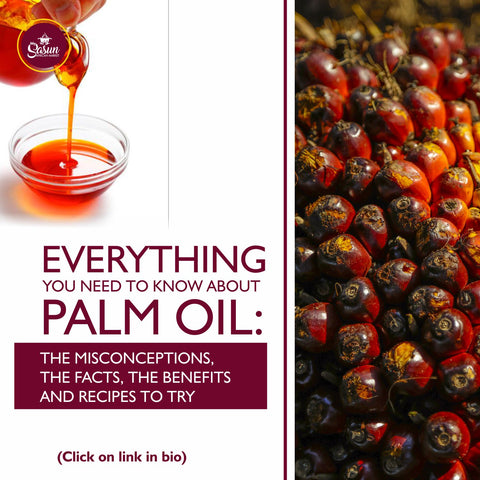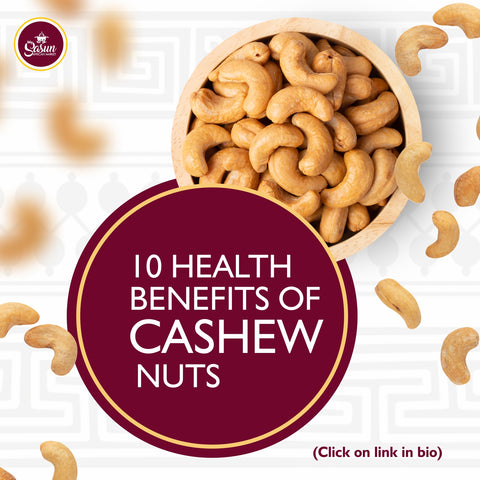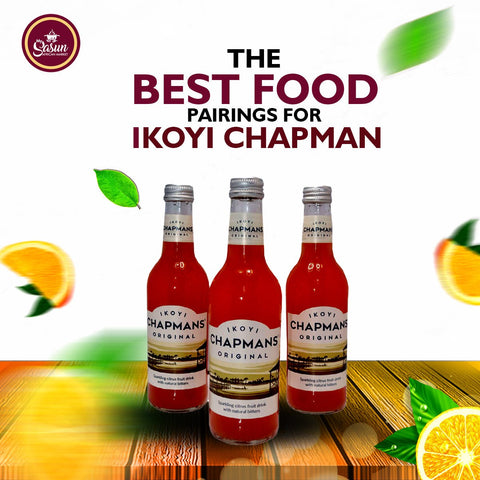Palm oil has become a hot topic in recent years, generating significant debate and raising important questions about its production, consumption, and impact on the environment. In this blog post, I will be shedding light on palm oil by addressing common misconceptions, providing essential facts, and discussing its significance in African cuisines today.

THE MISCONCEPTIONS ABOUT PALM OIL
READ EXPLORING THE RICH DIVERSITY OF NIGERIAN VEGETABLES
Palm Oil Production is Responsible for Deforestation
The association between palm oil production and deforestation is a complex issue. While unsustainable palm oil cultivation has indeed led to deforestation in some regions, it's important to recognize that efforts have been made to promote sustainable palm oil production. Certifications like RSPO (Roundtable on Sustainable Palm Oil) ensure responsible cultivation practices, minimizing environmental harm.
All Palm Oil is the same
Not all palm oil is created equal. There are two primary types of palm oil: red palm oil and refined palm oil. Red palm oil, also known as unrefined palm oil, retains its natural red color and is rich in carotenoids and antioxidants. Refined palm oil, on the other hand, undergoes processing that removes some of these beneficial compounds. Choosing red palm oil can provide greater nutritional benefits.
Palm Oil is an Unnatural Product:
Palm oil is derived from the fruit of the oil palm tree. It's a naturally occurring vegetable oil, just like olive oil, coconut oil, or soybean oil. The processing methods may vary, but the oil itself is a natural product.
All Palm Oil is Genetically Modified (GMO):
Not all palm oil is genetically modified. In fact, the majority of palm oil in use today is not genetically modified. However, some concern remains regarding the potential for GM palm oil in the future.
Palm Oil is a Low-Quality Oil:
Palm oil is a versatile and valuable cooking oil, used in a wide range of culinary traditions. Its high smoke point makes it suitable for frying and sautéing. The choice to use palm oil depends on its appropriateness for a particular culinary application.
Palm Oil is Harmful to Health:
Red palm oil, which is unrefined, is often richer in antioxidants and beneficial compounds. It can be part of a healthy diet when consumed in moderation.
Palm Oil Causes Damage to the Brain:
This is a common misconception that stems from concerns about the saturated fat content in palm oil. While palm oil is high in saturated fats, it also contains tocotrienols, a form of vitamin E, which has been associated with improved brain health and cognitive function.
Palm Oil Causes Cancer:
There is no direct scientific evidence to link palm oil consumption to cancer. In fact, the tocotrienols in palm oil have antioxidant properties that can help protect cells from damage, reducing the risk of cancer.
Palm Oil Has No Vitamins:
Palm oil contains various vitamins, including vitamin E (tocopherols and tocotrienols), which are essential for maintaining healthy skin, eyes, and a strong immune system. It is not devoid of vitamins as some may believe.
Palm Oil is Bad for the Heart:
The belief that palm oil is harmful to heart health is based on the misconception that all saturated fats are equally detrimental. However, palm oil contains palmitic acid, a type of saturated fat that does not raise cholesterol levels as much as other saturated fats. In moderation, it can be part of a heart-healthy diet.
IS PALM OIL A SUPERFOOD?
When it comes to superfoods, palm oil may not be the first thing that comes to mind, but it is considered a superfood by many. Derived from the fruit of the oil palm tree, palm oil has been a staple in the diets of many cultures for centuries. It is not only a versatile cooking oil but also a nutritional powerhouse with a wide range of health benefits. Let’s explore a lonbg list of compelling reasons why palm oil deserves the title of a global superfood.
- Rich in Antioxidant: Palm oil is a rich source of antioxidants, including tocotrienols and tocopherols, which help protect the body's cells from oxidative damage. These antioxidants can have a positive impact on overall health.
- High in Vitamin E: Vitamin E is essential for maintaining healthy skin, eyes, and a strong immune system. Palm oil is one of the best sources of this important vitamin.
- Heart-Healthy Fats: While palm oil is high in saturated fats, it contains a specific type of saturated fat called palmitic acid, which does not raise cholesterol levels. In fact, it can help maintain a healthy balance of cholesterol in the body.
- Supports Brain Health: The antioxidants in palm oil, particularly tocotrienols, have been associated with improved brain health. They may help protect against neurodegenerative diseases such as Alzheimer's.
- Boosts Immunity: The vitamin E in palm oil plays a significant role in strengthening the immune system, and helping the body fight off infections and diseases.
- Nutrient-Rich: Palm oil is a good source of various essential nutrients, including vitamin K, which is vital for blood clotting and bone health.
- Aids in Vision Health: Vitamin E in palm oil can help protect against age-related eye disorders and maintain good vision.
- Supports Skin Health: The antioxidants in palm oil contribute to healthy and radiant skin by preventing damage from UV radiation and promoting collagen production.
- Natural Red Palm Oil: Red palm oil, a variant of palm oil, contains high levels of carotenoids, which give it a distinctive red color. These carotenoids are converted into vitamin A in the body, promoting good vision and overall health.
- Versatile Cooking Oil: Beyond its health benefits, palm oil is a versatile cooking oil. Its high smoke point makes it ideal for frying and sautéing. It also adds a unique flavor to dishes and helps food retain its nutrients.
- Versatility in Cuisine: Palm oil is not limited to a specific cuisine; it is used in various culinary traditions worldwide. Its distinctive flavor can enhance a wide range of dishes, from West African stews to Southeast Asian curries.
- Long Shelf Life: Palm oil has a longer shelf life compared to many other oils, reducing the need for preservatives and additives in food products.
- Balanced Fatty Acid Profile: While palm oil contains saturated fats, it also has a balanced fatty acid profile with monounsaturated and polyunsaturated fats, making it a well-rounded cooking oil.
- Reduces Vitamin Deficiency: In regions where vitamin A deficiency is prevalent, red palm oil can help combat this issue, as it is a rich source of pro-vitamin A carotenoids.
- Adds Color and Flavor: The vibrant red or orange color of palm oil adds an appealing visual element to dishes. Its unique taste enhances the overall dining experience.
SPECIAL DELICACIES YOU CAN MAKE WITH PALM OIL:
Apart from palm oil rice, akara, okro, gbegiri and so on, there are other unique African recipes you can try to enjoy in moderation, the richness of palm oil:
Moambe Chicken
Moambe chicken, also known as poulet moambe, is a popular dish in Central Africa, particularly in the Democratic Republic of Congo. It's a savory and slightly spicy chicken stew made with palm oil, ground peanuts, and often flavored with tomato sauce. To make moambe chicken, brown chicken pieces in palm oil, then add a sauce made from palm nuts, peanuts, and tomatoes. The result is a rich, creamy, and aromatic stew that's traditionally served with rice or plantains.
Banga Soup
Banga soup, also known as palm nut soup, is a delicacy in Nigeria and other West African countries. It is made from palm nut extract and is typically served with starches like fufu, eba, or pounded yam. To prepare this flavorful soup, you'll need palm oil, palm nut extract, and an array of spices. Boil the palm nut extract with palm oil and add your choice of protein like meat or fish. Season the soup with spices like crayfish, chili peppers, and scent leaves for a fragrant and satisfying meal.
Egusi Stew
Egusi stew is another popular West African dish, particularly in Nigeria. It's made with ground egusi seeds and is often served with pounded yam or fufu. To prepare this stew, mix ground egusi seeds with water to form a paste and set it aside. In a separate pot, heat palm oil, sauté onions, and add a variety of vegetables and your choice of protein. Then, add the egusi paste, season with spices, and let it simmer until the stew thickens.
Ata Dindin (Fried Pepper Sauce)
Ata Dindin is a spicy fried pepper sauce that is a staple in Nigerian cuisine. It's a versatile sauce that can be used to enhance the flavors of various dishes. To make Ata Dindin, heat palm oil, add chopped bell peppers, onions, and scotch bonnet peppers. Season with spices like thyme and curry powder. This sauce is perfect for dipping fried plantains or yam or serving as a condiment for rice dishes.
Efo Riro
Efo Riro is a traditional Nigerian vegetable soup that is both nutritious and delicious. It's made with a variety of leafy greens, palm oil, and protein sources like meat or fish. To prepare Efo Riro, heat palm oil and sauté onions and ground crayfish. Add your choice of protein and a mixture of leafy vegetables such as spinach, kale, or collard greens. Season with spices and simmer until the greens are tender and the flavors are well combined. Efo Riro is typically served with pounded yam, eba, or rice.
READ 23 LEAFY VEGETABLES IN WEST AFRICAN CUISINE
Muamba de Galinha
Muamba de Galinha, often simply called Muamba, is a traditional Angolan dish. It is a chicken stew made with palm oil, okra, and a variety of seasonings. To prepare Muamba de Galinha, start by sautéing onions and garlic in palm oil, then add chicken pieces and season with spices like paprika, ginger, and garlic. Add okra and let the stew simmer until the chicken is tender and the flavors meld together. This stew is commonly served with rice or funge, a traditional Angolan side dish.
I hope you enjoyed reading this blog today. http://Mysasun.com has a myriad of healthy palm oil brands you can choose from. Visit the website and start to place your order today. Why delay having such a superfood in your kitchen, friend?







Comments (7)
“In the crypto world, this is great news I want to share. Last year, I fell victim to a scam disguised as a safe investment option. I have invested in crypto trading platforms for about 10yrs thinking I was ensuring myself a retirement income, only to find that all my assets were either frozen, I believed my assets were secure — until I discovered that my BTC funds had been frozen and withdrawals were impossible. It was a devastating moment when I realized I had been scammed, and I thought my Bitcoin was gone forever, Everything changed when a close friend recommended the Capital Crypto Recover Service. Their professionalism, expertise, and dedication enabled me to recover my lost Bitcoin funds back — more than €560.000 DEM to my BTC wallet. What once felt impossible became a reality thanks to their support. If you have lost Bitcoin through scams, hacking, failed withdrawals, or similar challenges, don’t lose hope. I strongly recommend Capital Crypto Recover Service to anyone seeking a reliable and effective solution for recovering any wallet assets. They have a proven track record of successful reputation in recovering lost password assets for their clients and can help you navigate the process of recovering your funds. Don’t let scammers get away with your hard-earned money – contact Email: Recoverycapital@fastservice.com
Phone CALL/Text Number: +1 (336) 390-6684 Contact: Capitalcryptorecover@zohomail.com
Website: https://recovercapital.wixsite.com/capital-crypto-rec-1
“In the crypto world, this is great news I want to share. Last year, I fell victim to a scam disguised as a safe investment option. I have invested in crypto trading platforms for about 10yrs thinking I was ensuring myself a retirement income, only to find that all my assets were either frozen, I believed my assets were secure — until I discovered that my BTC funds had been frozen and withdrawals were impossible. It was a devastating moment when I realized I had been scammed, and I thought my Bitcoin was gone forever, Everything changed when a close friend recommended the Capital Crypto Recover Service. Their professionalism, expertise, and dedication enabled me to recover my lost Bitcoin funds back — more than €560.000 DEM to my BTC wallet. What once felt impossible became a reality thanks to their support. If you have lost Bitcoin through scams, hacking, failed withdrawals, or similar challenges, don’t lose hope. I strongly recommend Capital Crypto Recover Service to anyone seeking a reliable and effective solution for recovering any wallet assets. They have a proven track record of successful reputation in recovering lost password assets for their clients and can help you navigate the process of recovering your funds. Don’t let scammers get away with your hard-earned money – contact Email: Recoverycapital@fastservice.com
Phone CALL/Text Number: +1 (336) 390-6684 Contact: Capitalcryptorecover@zohomail.com
Website: https://recovercapital.wixsite.com/capital-crypto-rec-1
“In the crypto world, this is great news I want to share. Last year, I fell victim to a scam disguised as a safe investment option. I have invested in crypto trading platforms for about 10yrs thinking I was ensuring myself a retirement income, only to find that all my assets were either frozen, I believed my assets were secure — until I discovered that my BTC funds had been frozen and withdrawals were impossible. It was a devastating moment when I realized I had been scammed, and I thought my Bitcoin was gone forever, Everything changed when a close friend recommended the Capital Crypto Recover Service. Their professionalism, expertise, and dedication enabled me to recover my lost Bitcoin funds back — more than €560.000 DEM to my BTC wallet. What once felt impossible became a reality thanks to their support. If you have lost Bitcoin through scams, hacking, failed withdrawals, or similar challenges, don’t lose hope. I strongly recommend Capital Crypto Recover Service to anyone seeking a reliable and effective solution for recovering any wallet assets. They have a proven track record of successful reputation in recovering lost password assets for their clients and can help you navigate the process of recovering your funds. Don’t let scammers get away with your hard-earned money – contact Email: Recoverycapital@fastservice.com
Phone CALL/Text Number: +1 (336) 390-6684 Contact: Capitalcryptorecover@zohomail.com
Website: https://recovercapital.wixsite.com/capital-crypto-rec-1
HIRE THE TOP CRYPTO & BITCOIN RECOVERY EXPERTS THE HACK ANGELS
I have always thought it would be impossible to recover stolen cryptocurrency funds until I came across a hacker called THE HACK ANGELS RECOVERY EXPERT. Thanks to their expertise and dedication. If you’ve lost Bitcoin due to a wrong transaction, hacking, or forgotten private keys, THE HACK ANGELS RECOVERY EXPERT is here to help. If they could recover my $820,000 there’s hope for you too. I highly endorse their services to anyone looking to have their funds traced and recovered. You can get in touch with them through their Contact
WhatsApp (+1(520)200-2320
Email at support@thehackangels.com
Website at www.thehackangels.com
If you’re in London, you can even visit them in person at their office located at 45-46 Red Lion Street, London WC1R 4PF, UK.
Hello everyone, i have a very important information about herpes virus, i was a victim of hsv1&2 until i met doctor Ahonsie, it still feels like a dream to me. it has been two years now, i have not experience any breakout of herpes. I new about him through a post made on social media, a lady shares her experience and then i decided to contact him and ever since i contacted i was encourage and with no doubt i was cured from herpes simplex in just two weeks. He also treat other illnesses like HPV, HIV, CANCER, THYRIOD, PENIS ENLARGEMENT, and more contact him via Email: drahonsie00@gmail.com / WhatsApp: +2348039482367. https://drahonsie002.wixsite.com/dr-ahonsie https://www.facebook.com/drstellaherbalhome?mibextid=ZbWKwLThanks
I thought the physicians says there is no cure for HSV 2!!! I am telling you today that Dr ahonsie cure HSV 2 with his herbal medicine and once you get cured you are cured forever it is never reversible, I have been suffering for this deadly disease called h HSV 2 for more than a 2years and lost all hope because my doctor says there is no cure for HSV 2. Brethren I saw a testimony on the internet on how Dr ahonsie cure HSV, Hapatitis etc with his herbal medication and an email and watsapp to contact him was also displayed, I thought this was joke but I decided to contact him and he replied telling me not to worry that my problem is over . Dr ahonsie sent me a herbal medication to drink for one month but only 2weeks I feel strange and I went to my doctor and he confirmed me negative. He can help you too. Contact him drahonsie00@gmail.com or whatsapp +2348039482367 https://drahonsie002.wixsite.com/dr-ahonsie https://www.facebook.com/drstellaherbalhome?mibextid=ZbWKwL
My purpose out here today is to share this article to the world about how Doctor Odunga helped me in getting back my EX-boyfriend who broke up with me 4 months ago. I tried all I could to make him see reasons with me so that we can continue our relationship but he denied me. Thank God for giving me the thought of going into the internet for help, I searched properly and I saw different reviews of Doctor Odunga and I insisted on giving it a try by contacting him via what’s app on (+2348167159012). He gave me reason to live again and he prepared a spell and told me that my Ex-boyfriend will come back to me within 11 hours. Can you believe it, my EX-boyfriend came back to me, proposed to me and our wedding will be held soon. Contact him now!!! if you need any help. Email: odungaspelltemple@gmail.com and he does a lot of spells. Once again i want to say am very grateful for your help